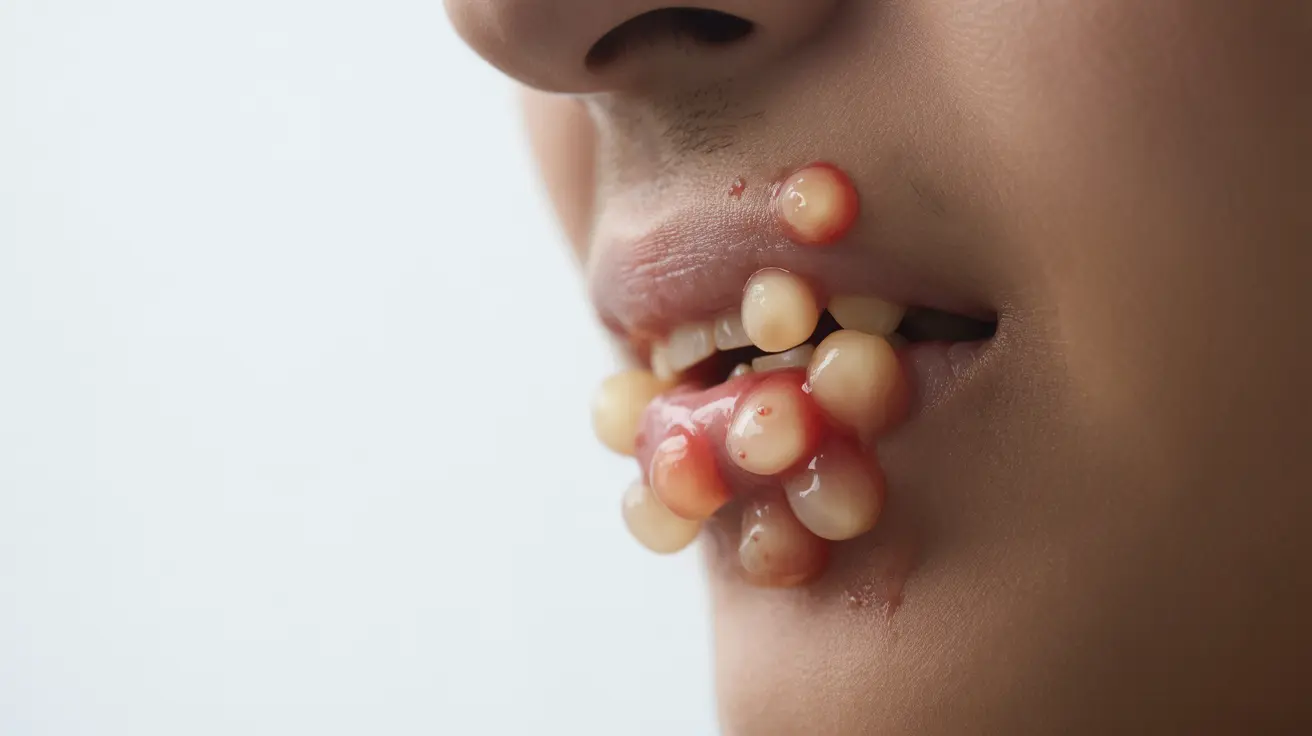Mouth sores can be uncomfortable and concerning, affecting your ability to eat, speak, and go about daily activities. These painful lesions can appear anywhere in the oral cavity, including the lips, gums, tongue, and inner cheeks. Understanding their causes and proper treatment approaches is essential for quick healing and prevention of future occurrences.
While most mouth sores heal on their own within 1-2 weeks, knowing how to identify different types and implement effective management strategies can significantly improve your comfort and recovery time. This comprehensive guide explores the various aspects of mouth sores, from identification to treatment and prevention.
Types of Mouth Sores and Their Causes
Different types of mouth sores have distinct characteristics and underlying causes:
Canker Sores
These common, non-contagious ulcers appear as round white or gray spots with a red border. They typically develop due to stress, minor injuries, or certain foods. Unlike cold sores, canker sores only occur inside the mouth.
Cold Sores
Caused by the herpes simplex virus (HSV-1), cold sores typically appear on or around the lips. They begin as small blisters that eventually break and crust over. These sores are highly contagious and can spread through direct contact.
Other Common Types
Additional forms of mouth sores include:
- Trauma-induced sores from dental work or accidental biting
- Nutritional deficiency sores
- Medication-related ulcers
- Bacterial or fungal infection sores
Treatment Options and Home Remedies
Several effective treatment approaches can help manage mouth sores:
Over-the-Counter Solutions
Available treatments include:
- Antimicrobial mouth rinses
- Topical pain-relieving gels
- Protective paste or gel barriers
- Salt water rinses
Natural Remedies
Several natural approaches can provide relief:
- Honey application
- Aloe vera gel
- Chamomile tea rinses
- Ice chips for pain relief
Prevention Strategies
Implementing these preventive measures can reduce the occurrence of mouth sores:
Dietary Considerations
- Avoid triggering foods (spicy, acidic, or abrasive items)
- Maintain a balanced diet rich in vitamins B12, C, and zinc
- Stay hydrated
- Choose soft, easily chewable foods when sores are present
Lifestyle Modifications
- Practice good oral hygiene
- Manage stress levels
- Avoid tobacco products
- Use lip balm with SPF protection
When to Seek Medical Attention
Consult a healthcare provider if you experience:
- Sores lasting longer than two weeks
- Unusually large or painful sores
- Frequent recurrence
- Fever or significant swelling
- Difficulty eating or drinking
Frequently Asked Questions
What are the common causes of mouth sores and how can I identify different types like canker sores and cold sores?
Common causes include viral infections (like HSV-1 for cold sores), stress, tissue injury, and nutritional deficiencies. Canker sores appear as white or gray spots with red borders inside the mouth, while cold sores typically form as fluid-filled blisters on or around the lips.
How can I treat mouth sores at home and when should I see a doctor for persistent or severe sores?
Home treatments include salt water rinses, over-the-counter pain relievers, and protective gels. See a doctor if sores persist beyond two weeks, are unusually large or painful, or are accompanied by fever or significant swelling.
What lifestyle and dietary changes can help prevent mouth sores from developing or recurring?
Maintain good oral hygiene, avoid triggering foods, manage stress levels, and ensure adequate nutrition. Stay hydrated and protect your lips from sun exposure with SPF lip balm.
Are there specific vitamins or supplements that can reduce the risk or help heal mouth sores faster?
Vitamins B12, C, and zinc supplements may help prevent and heal mouth sores. However, consult with a healthcare provider before starting any supplement regimen.
How do infections like herpes simplex virus cause mouth sores, and what precautions can prevent spreading them?
HSV-1 causes cold sores through direct contact with infected areas or items. Prevent spread by avoiding touching sores, not sharing personal items, and washing hands frequently. Avoid intimate contact during active outbreaks.




